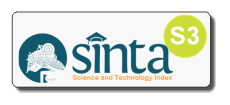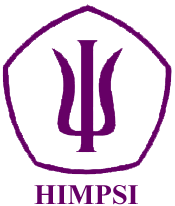Correlation between Meaningful Work and Employee Job Crafting with Mediator Work Engagement
Abstract
Full Text:
PDFReferences
Ahmed, U., Majid, A. H. A., & Zin, M. L. M. (2016). Meaningful Work and Work Engagement: A Relationship Demanding Urgent Attention. International Journal of Academic Research in Business and Social Sciences, 6(8), 116–122.
Aribowo, H., & Wirapraja, A. (2018). Strategi Inovasi dalam Rangka Menjaga Keberlanjutan Bisnis dalam Menghadapi Era Volatility, Uncertainty, Compelxity, Dan Ambiguity (VUCA). Jurnal Ilmu Manajemen Dan Akuntansi Terapan (JIMAT), 9(1), Article 1.
Bakker, A. B., & Demerouti, E. (2014). Job Demands–Resources Theory. In Wellbeing (Vol. 3, pp. 1–28). New York: John Wiley & Sons, Ltd. https://doi.org/10.1002/9781118539415.wbwell019
Bakker, A. B., & Demerouti, E. (2017). Job Demands–Resources Theory: Taking Stock and Looking Forward. Journal of Occupational Health Psychology, 22(3), 273–285. https://doi.org/10.1037/ocp0000056
Bakker, A. B., & Leiter, M. P. (2010). Work Engagement: A Handbook of Essential Theory and Research. London: Psychology Press.
Berg, J. M., Wrzesniewski, A., & Dutton, J. E. (2010). Perceiving and Responding to Challenges in Job Crafting at Different Ranks: When Proactivity Requires Adaptivity. Journal of Organizational Behavior, 31(2–3), 158–186. https://doi.org/10.1002/job.645
Dan, C.-I., Roşca, A. C., & Mateizer, A. (2020). Job Crafting and Performance in Firefighters: The Role of Work Meaning and Work Engagement. Frontiers in Psychology, 11. https://www.frontiersin.org/articles/10.3389/fpsyg.2020.00894
Dik, B. J., Byrne, Z. S., & Steger, M. F. (2013). Purpose and Meaning in the Workplace. Washington, DC: American Psychological Association.
Geldenhuys, M., Łaba, K., & Venter, C. M. (2014). Meaningful Work, Work Engagement and Organisational Commitment. SA Journal of Industrial Psychology, 40(1), Article 1. https://doi.org/10.4102/sajip.v40i1.1098
Kristiana, I. F., Fajrianthi, F., & Purwono, U. (2019). Analisis Rasch dalam Utrecht Work Engagement Scale-9 (UWES-9) Versi Bahasa Indonesia. Jurnal Psikologi, 17(2), 204–217. https://doi.org/10.14710/jp.17.2.204-217
Lazazzara, A., Tims, M., & de Gennaro, D. (2020). The Process of Reinventing a Job: A Meta–Synthesis of Qualitative Job Crafting Research. Journal of Vocational Behavior, 116, 103267. https://doi.org/10.1016/j.jvb.2019.01.001
Linacre, J. M. (2006). Rasch Analysis of Rank-Ordered Data. Journal of Applied Measurement, 7(1), 129–139.
Preacher, K. J. (2011). Multilevel SEM Strategies for Evaluating Mediation in Three-Level Data. Multivariate Behavioral Research, 46(4), 691–731. https://doi.org/10.1080/00273171.2011.589280
Salamzadeh, A., & Dana, L. P. (2021). The Coronavirus (COVID-19) Pandemic: Challenges Among Iranian Startups. Journal of Small Business & Entrepreneurship, 33(5), 489–512. https://doi.org/10.1080/08276331.2020.1821158
Schaufeli, W. B., Bakker, A. B., & Salanova, M. (2016). The Measurement of Work Engagement With a Short Questionnaire. Educational and Psychological Measurement. https://doi.org/10.1177/0013164405282471
Steger, M. F., Dik, B. J., & Duffy, R. D. (2012). Measuring Meaningful Work: The Work and Meaning Inventory (WAMI). Journal of Career Assessment, 20(3), 322–337. https://doi.org/10.1177/1069072711436160
Sumintono, B., & Widhiarso, W. (2013). Aplikasi Model Rasch untuk Penelitian Ilmu-Ilmu Sosial. Cimahi: TrimKom Publishing House.
Tims, M., Bakker, A. B., & Derks, D. (2012). Development and Validation of the Job Crafting Scale. Journal of Vocational Behavior, 80(1), 173–186. https://doi.org/10.1016/j.jvb.2011.05.009
van Wingerden, J., & Poell, R. F. (2019). Meaningful Work and Resilience Among Teachers: The Mediating Role of Work Engagement and Job Crafting. PLOS ONE, 14(9), e0222518. https://doi.org/10.1371/journal.pone.0222518
Wrzesniewski, A., & Dutton, J. E. (2001). Crafting a Job: Revisioning Employees as Active Crafters of Their Work. The Academy of Management Review, 26(2), 179–201. https://doi.org/10.2307/259118
DOI: http://dx.doi.org/10.17977/um023v12i12023p20-27
Refbacks
- There are currently no refbacks.
Copyright (c) 2023 Jurnal Sains Psikologi

This work is licensed under a Creative Commons Attribution 4.0 International License.
Reference Manager :
|
Aliansi:
Plagiarism Checker :
This work is licensed under a Creative Commons Attribution 4.0 International License.



1.png)








